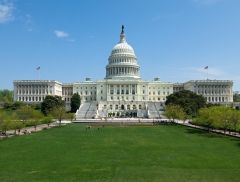 Pressure on Capitol Hill for Trade Promotion Authority (TPA) is growing.
Pressure on Capitol Hill for Trade Promotion Authority (TPA) is growing.
TPA – called “fasttrack” in the 1990s when it was used to negotiate NAFTA – allows the executive branch to negotiate trade agreements that Congress cannot amend during the ratification process. It also sets procedural rules under which trade agreements are negotiated, and the objectives of the United States for the outcomes of trade negotiations.
At last week’s Senate Finance Committee hearings on the Trans Pacific Partnership, Chairman Max Baucus said that he “would like to see a bipartisan TPA [Trade Promotion Authority] bill introduced by June.” Ranking Minority Member Orin Hatch also called for legislation, chiding the administration for not moving forward on this measure: “While I appreciate the administration’s interest in discussing Trade Promotion Authority or TPA, I have yet to see any real commitment on the part of the White House to achieving its quick consideration and approval in Congress.” Last month, Acting U.S. Trade Representative Demetrios Marantis testified before the committee, and promised to move TPA forward.
TPA was last granted to the executive branch in the Trade Act of 2002, but the authority expired in 2007. The Trade Act of 2002 included specific negotiating objectives for USTR for each section of trade agreements, including intellectual property. Assuming the upcoming TPA legislation is structured the same way as the expired TPA, this presents an opportunity for public interest IP advocates to weigh in on what USTR’s goals should be when it tables text for future agreements.
In last month’s trade hearing, Senators referred to the negotiating objectives (though not specifically the IP objectives). For instance, Sen. Brown asked how a rewritten TPA bill could “ensure that the benefits of trade are shared more broadly than they have in the past,” and he asked if the administration would seek any new objectives. Acting USTR Maurantis promised to consult the Senators on the committee about the negotiating objectives within new TPA legislation.
The specific objectives for intellectual property in the Trade Act of 2002 were spelled out in 19 USC 3802 (b)(4). They were focused squarely on rightholder concerns. Public interest stakeholders – if they engage in the legislative process – may be able to shape the next set of negotiating objectives for future trade negotiations. There are certain area where legislators could certainly improve on the old language.
(A)(i)(II) instructs USTR to seek IPR provisions that reflect a “standard of protection similar to that found in United States law.” This is a place where language could be changed to reflect the balance of rightholder and user rights embodied in U.S. law, including through flexible limitations and exceptions. USTR has begun to promote flexible limitations and exceptions to copyright (for instance, IP negotiator Probir Mehta recently stressed that USTR is seeking “binding commitments” on flexibilities in the TPP), but it would be optimal to include the promotion balanced IP regimes in USTR’s formal negotiating objectives. And this includes balance in areas other than limitations and exceptions to copyright.
(A)(iv) instructs USTR to ensure that “standards of protection and enforcement keep pace with technological developments, and in particular ensuring that rightholders have the legal and technological means to control the use of their works through the Internet and other global communication media, and to prevent the unauthorized use of their works.” An updated version of this clause could reflect the fact that protections for consumers and industries that rely copyright flexibilities should also “keep pace with technological developments.”
(C) instructs USTR “to respect the Declaration on the TRIPS Agreement and Public Health, adopted by the World Trade Organization at the Fourth Ministerial Conference at Doha, Qatar on November 14, 2001.” Despite this clause, USTR routinely tables texts with TRIPS-plus provisions that limit the policy options protected by the Doha Declaration in order to increase access to medicines. It would be interesting to consider alternative language that more clearly forbids USTR from tabling texts that would encroach upon “the right of WTO members to use, to the full, the provisions in the TRIPS Agreement” to promote access to medicine, as guaranteed by paragraph four of the Doha Declaration.
Here is the full section dealing with intellectual property negotiating objectives (19 USC 3802 (b)(4)):
The principal negotiating objectives of the United States regarding trade-related intellectual property are—
(A) to further promote adequate and effective protection of intellectual property rights, including through—
(i)
(I) ensuring accelerated and full implementation of the Agreement on Trade-Related Aspects of Intellectual Property Rights referred to in section 3511 (d)(15) of this title, particularly with respect to meeting enforcement obligations under that agreement; and
(II) ensuring that the provisions of any multilateral or bilateral trade agreement governing intellectual property rights that is entered into by the United States reflect a standard of protection similar to that found in United States law;
(ii) providing strong protection for new and emerging technologies and new methods of transmitting and distributing products embodying intellectual property;
(iii) preventing or eliminating discrimination with respect to matters affecting the availability, acquisition, scope, maintenance, use, and enforcement of intellectual property rights;
(iv) ensuring that standards of protection and enforcement keep pace with technological developments, and in particular ensuring that rightholders have the legal and technological means to control the use of their works through the Internet and other global communication media, and to prevent the unauthorized use of their works; and
(v) providing strong enforcement of intellectual property rights, including through accessible, expeditious, and effective civil, administrative, and criminal enforcement mechanisms;
(B) to secure fair, equitable, and nondiscriminatory market access opportunities for United States persons that rely upon intellectual property protection; and
(C) to respect the Declaration on the TRIPS Agreement and Public Health, adopted by the World Trade Organization at the Fourth Ministerial Conference at Doha, Qatar on November 14, 2001.




